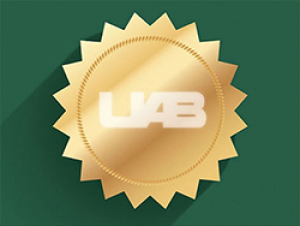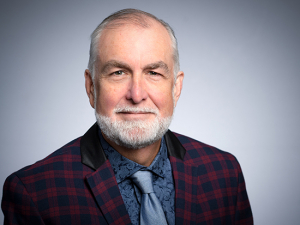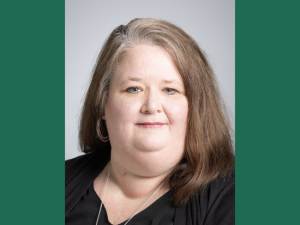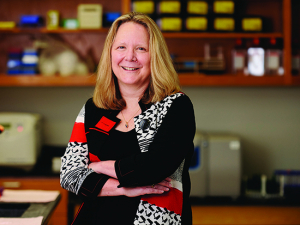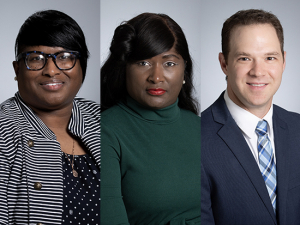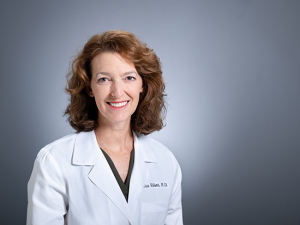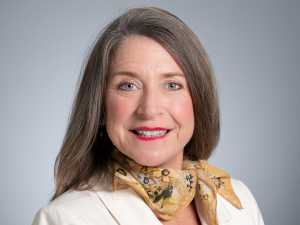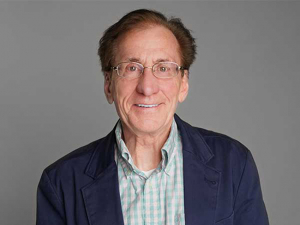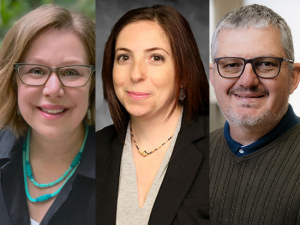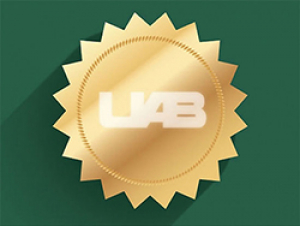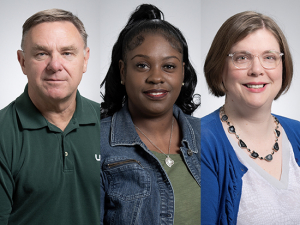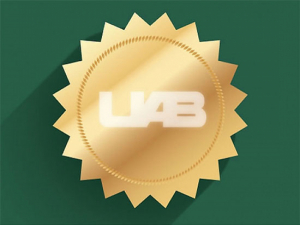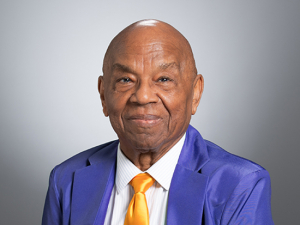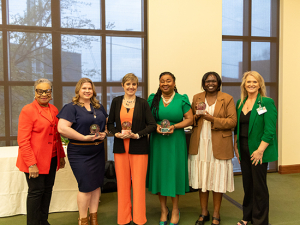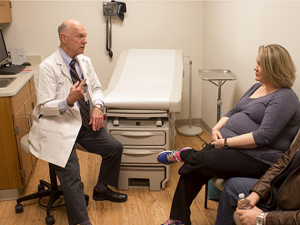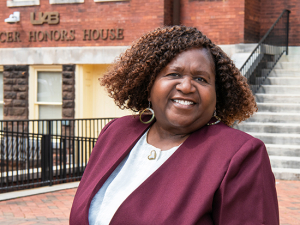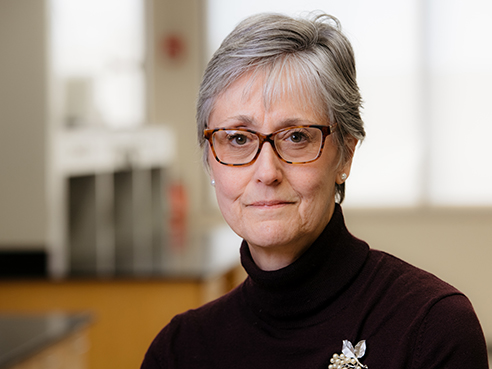 Chemistry Professor Jacqueline Nikles, Ph.D., is the recipient of the 2022 Ellen Gregg Ingalls/UAB National Alumni Society Award for Lifetime Achievement in Teaching.
Chemistry Professor Jacqueline Nikles, Ph.D., is the recipient of the 2022 Ellen Gregg Ingalls/UAB National Alumni Society Award for Lifetime Achievement in Teaching.
Organic chemistry is a class in which many students hit the wall academically — not because they lack intelligence — but because they lack strong study habits. To succeed in these courses, students must actively participate in learning, says Jacqueline Nikles, Ph.D., who has been challenging UAB students for more than two decades.
During that time, colleagues say Nikles has proven herself highly qualified at all levels of instruction, and her students regard her as a positive, engaging person who trains them to be problem-solvers. For these reasons and more, Nikles, a professor in the College of Arts and Sciences Department of Chemistry, received the 2022 Ellen Gregg Ingalls/UAB National Alumni Society Award for Lifetime Achievement in Teaching. The award is presented annually to a faculty member who has demonstrated an outstanding commitment to teaching throughout their career. She was honored along with other award winners, plus newly promoted and tenured faculty during the New Faculty and Faculty Recognition Reception Sept. 13.
“The best part of working at a university is the students,” Nikles said. “There has rarely been a semester in the past 20 years where I haven’t learned something new from my students. The questions they ask, and their insights, push me to be a better educator."
“The best part of working at a university is the students. There has rarely been a semester in the past 20 years where I haven’t learned something new from my students. The questions they ask, and their insights, push me to be a better educator." |
Nikles deserves this award for her achievements in teaching, scholarship and service and for her national reputation in the field of chemical education, says Richard A. Dluhy, Ph.D. As required of all recipients of this award, she also received the President’s Award for Excellence in Teaching for Natural Science and Mathematics in 2004.
“Dr. Nikles provides considerable guidance to both graduate and undergraduate students in classroom and laboratory management,” Dluhy said. “As chair of the department of chemistry, I find that Dr. Nikles is genuinely interested in students leaving her classroom with a clear understanding of the subject.”
Dluhy points to her scores on the IDEA (Individual Development and Educational Assessment) survey — a tool that allows students to rate their learning experience in a classroom — as a numerical measure of her skills. Her IDEA survey scores consistently range from 4 to 5, “which are truly excellent scores for someone who teaches large sections of courses such as second-year organic chemistry, a particularly demanding and stressful course for many undergraduates.
“Students completing these classes are well prepared for their future chemistry courses, as well as for professional and graduate admission exams,” Dluhy said.
One reason, Dluhy suggested, is her scholarly activity in the area of curriculum development, which includes the development of a new writing curriculum and contributions to the Honors Organic Chemistry section. To make the courses more accessible, Nikles also applied for and received an Affordable Instructional Material grant to develop digital materials — text and video — that students could access for free using Canvas.
“Jackie has trained hundreds of graduate teaching assistants who look to her for her wealth of knowledge not only as an educator but also as an organic chemist. Many of these graduate students were inspired to move into academia and modeled their career after hers.” |
Nikles also was instrumental in starting the Chemistry Scholars (ChemScholars) Program, a unique peer-driven assistantship program for undergraduates that recruits high-achieving, first-year chemistry majors and pairs them with graduate students as a learning-teaching team. As Nikles states in her teaching philosophy, “If you can teach another person, then you truly understand the material.”
“Her impact on education, both in her classroom and beyond, is undeniable,” said Assistant Professor Mitzy Erdmann, Ph.D., the recruitment coordinator for the ChemScholars program, who considers Nikles “a role model for female scientists.”
Nikles provides varied instructional approaches to meet the needs of a range of learners while ensuring that each student is held to the same standard and offered the same opportunities for success, Erdmann says. This was especially evident during the COVID-19 pandemic when she quickly adapted her course to a flipped model and pre-recorded numerous lectures and tutorials.
“The quality of her classes in such a difficult time demonstrates her commitment to continuous professional development and improvement in the classroom. It also sets the expectation that she will continue to excel in the classroom, as she continues to adopt and adapt new teaching techniques and technologies,” Erdmann said. “Her students see this effort and they respond to it.”
“Jackie has trained hundreds of graduate teaching assistants who look to her for her wealth of knowledge not only as an educator but also as an organic chemist,” said Erdmann, who noted that Nikles was a member of her own graduate committee. “Many of these graduate students were inspired to move into academia and modeled their career after hers.”
Todd McCarty, M.D., assistant professor in the Division of Infectious Diseases, is one of them. “As a pre-medical student, organic chemistry was often referred to as the hardest pair of courses from the collection of universal requirements for medical school applications. While the material was certainly challenging, Dr. Nikles took the time to present the material and teach in a variety of different ways to facilitate learning across the spectrum of students taking the class. The class and the material were so enjoyable that I was able to work as a teaching assistant for the courses for the following five semesters.
“Over the next two years, I saw the type of educator that I wanted to be,” Dr. McCarty said.
“I cannot fully articulate the impact of having a teacher who I could see myself in had on my life and career.” |
So did Rachel Prado, Ph.D., a former ChemScholar who now is a lecturer at Auburn University. “Dr. Nikles was my very first female chemistry professor. I cannot fully articulate the impact of having a teacher who I could see myself in had on my life and career,” Prado said. “The lessons she taught me, I use daily.”
“Seeing a successful woman in STEM in my desired major encouraged me to choose UAB,” said Olivia Johnston, an undergraduate in the Science and Technology Honors Program who was recruited to the ChemScholars Program by Nikles and Erdmann.Now a junior, Johnston also is an officer in the Student Affiliates of the American Chemical Society (SAACS) at UAB, which has consistently earned the highest ranking the ACS bestows — Outstanding Chapter. She says Nikles, the faculty sponsor, “is the pillar that has allowed the organization to thrive for years after its student founders graduated.”
“In my junior year, I can say that I made the correct decision, and my college experience has been immensely impacted by Dr. Nikles.”
